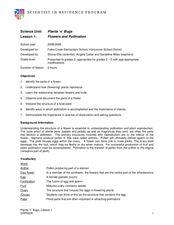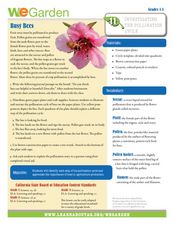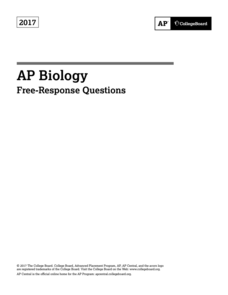Scholastic
Study Jams! Flowers
RJ hangs out in Zoe's garden as she explains pollination, flower anatomy, and fertilization. This cartoon-styled feature is sure to stay in your botanists' minds! Follow it with the dissection of large flowers, such as the lily.
Curated OER
Flowers and Pollination
Students explore the environment by researching plant reproduction. In this pollination instructional activity, students define botany related vocabulary terms such as disc flower, petal and fertilization. Students dissect a flower with...
Curated OER
From Flower to Fruit
Second graders examine the parts of a flower and how pollination occurs. In this flowers and pollination instructional activity, 2nd graders examine the parts of a flower with a hand lens focusing on the pollen. They watch as a...
Curated OER
Busy Bees
Students explore the pollination cycle. In this pollination lesson, students investigate the process of pollination. Students illustrate the pollination cycle of bees on paper plates.
Curated OER
The Disappearing Honeybees: Tracking Honeybee Decline
Students practice graphing and other math skills to track number of honeybee colonies present in United States since 1978, discuss major crops that are dependent on insect pollinators, and examine reasons for decline of United States...
Curated OER
Buzzy, Buzzy Bee
Students simulate honeybees pollinating flowers. In this pollination lesson, students role-play the process of pollination over the course of several seasons. Students graph results and share their graphs with the class.
Curated OER
Fish and Flowers
Students read and discuss a research article that explains the unlikely link between increased fish populations and increased plant pollination. They answer reading guide questions to discover this ecological relationship.
Curated OER
Bees
Students design an experiment. In this bees lesson, students research pollination and work collaboratively to discover how bees aid in pollination. Students use tomato plants and create experimental designs. Lesson adaptations...
Curated OER
Plant Reproduction Chapter #4
The only way to employ a plant reproduction presentation void of pictures is to support it with actual sample flowers. Botany beginners learn about plant reproduction through an underdeveloped outline of flower structures, reproductive...
The Science Spot
Flower Basics
Learn about plants and pollination with a worksheet about the parts of a flower. After labeling the anatomy of a flower using a word bank, kids explain the difference between self-pollination and cross-pollination, and unscramble...
Teacher Web
Plant Reproduction—Structure of a Flower
What happened to the plant in math class? It grew square roots. Here, a set of 11 worksheets provide a review of plant reproduction. It includes the structure of a flower and each part's function, pollination, fertilization, seed...
National Park Service
Biodiversity—Bee Week
If you want scholars to fall in love with bees, this is the unit for you! Celebrate bees with a full week of material—designed for the Next Generation Science Standards—that addresses the importance of pollination and fertilization....
EnLiST
Trap Your Own Insects: What’s in Your Backyard?
Young entomologists construct three types of insect traps—pitfall, pollinator, and panel—before setting their traps out and observing what they caught. They then observe what types of insects the different traps attract.
K12 Reader
What’s Eating You?
Introduce your class to producers, consumers, and pollinators with a reading passage. Class members read the text and respond to five related questions.
Curated OER
Pollinator Habitats
Students read and discuss background information included with this lesson. They brainstorm the best sources for developing a list of native or migratory pollinators. Students work in groups to design habitats based on information...
Curated OER
How Does My Garden Grow?
Learners research flower pollination. In this pollination lesson, students use the Internet to find information on the parts of a flower and pollination. They draw and label a flower and compete a flower power puzzle.
Garden Earth Naturalist Club
Parts of a Flower! Flower Dissection
Sometimes the best way to learn about plants is to see the different parts of a plant yourself. Groups of learners dissect flowers to answer questions about what they observe and what they wonder about their flower.
Museum of Science
Egg Carton Nursery
Observe nature in action. Young biologists make plant nurseries from cardboard egg cartons. Once the seeds sprout, they move the flowering plants outside and make observations of bees that pollinate the flowers.
College Board
2017 AP® Biology Free-Response Questions
With AP Biology remaining the most popular AP science exam, many teachers need help preparing. The College Board offers the actual free-response questions from the 2017 test covering pollination, germination, and more. Scholars learn the...
Curated OER
Science Jeopardy
Wow! Review an entire semester of biology curriculum playing this Science Jeopardy game! The variety of topics is extremely broad, so you will need to review each question to find if they all apply to your course. As you find material...
Curated OER
Design a Pollinator
Students make a scientific drawing of a pollinator with at least five traits that make them well adapted to a given plant(s). They describe in their science notebook the adaptations that make their pollinator well suited to a given plant.
Curated OER
From Flower to Fruit
Learners examine how flowers have essentially four parts. They learn both the male and female reproductive parts of the flower, then explore self-pollination and pollination by insects and other animals.
Curated OER
Dissecting A Flower
Students investigate the basic parts of tree flowers and their role in pollination. They study the process of pollination and fertilization of flowers and trees.
Curated OER
What Bees Eat
Students consider the concept that plants and animals are dependent on one another and role-play the interaction between bees and flowers. They identify crops that are dependent on pollination by bees.
Other popular searches
- Bees Pollination
- Flower Parts and Pollination
- Pollination Flow Chart
- Cross Pollination
- 6 Steps of Pollination
- Pollination Activities
- Pollination Flowchart
- Pollination Process
- Pollination and Fertilization
- Plants Pollination
- Cross Pollination
- Plants Cross Pollination

























